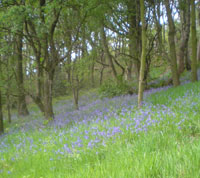Environmental projects and campaigns
Introduction

The environment is not simply a term that describes wildlife, waterways and landscapes, ‘the environment’ is everything on the planet - including us. Our whole planet, our blue marble in space can be seen as one ecosystem with all life relying on each other for existence. Human beings are the dominant animals on our planet and actions by us can easily enhance or damage systems that support us, this includes ecosystems and the climate.
Both the ecosystem and the climate is changing. For the climate this means we are likely to experience more flooding, faster coastal erosion, more heat-waves, droughts and extreme weather events. We need to take action now to prepare for these changes. Climate change is the most pressing environmental concern, however environmental damage effects our health and lifestyle in many ways:
- If we continue to burn fossil fuels at our present rate, greenhouse gases in the atmosphere will increase by 50% within 15 years causing catastrophic climate shifts.
- Over 100 million Europeans and North Americans live in cities where the air is unsafe to breathe.
- Over the last 10 years, environmental disasters have caused over $600 billion worth of damage across the world - more than in the previous four decades combined.
- More and more of the world’s population are now facing acute shortages of fresh water, slumps in food production, devastating floods for some and disastrous droughts for others.
- The rate of species extinction at present is estimated at 100 to 1000 times "background" or average extinction rates in the evolutionary time scale of planet Earth. With species disappearing, sources of new medicines are slipping away from us.
By working together society can reduce the damage to our environment and the Council together with our partners is taking steps to address these global issues through local actions:
- Calderdale's Energy Future: transforming Calderdale into a resilient low carbon economy;
- Environmental Management System: reducing the Council's own negative environmental impacts;
- Biodiversity Action Plan: enhancing local biodiversity;
- Corporate Travel Plan: reducing the impact of Council travel and commuting;
- Household recycling and recycling at the Council: reducing, reusing and recycling waste.
